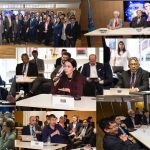AI Policy Reflections & Future Strategies

Following the exciting AI for Good Global Summit, I was involved in another very stimulating and thought provoking conference at the United Nations in Geneva, Switzerland with delegates, diplomats, representatives from across the globe in the audience. The event, AI: Current Policy Reflections and Future Strategies, was held at the Palais de Nations, United Nations on 18 May 2018. As first time visitor to the United Nations it was not only a privilege to be there, but also to partake in the discussion on “Adopting AI in Industries: Potential and Challenges” as invited AI expert and African representative. As mentioned here as well as this post, this was also an opportunity to represent the Machine Intelligence Institute of Africa (MIIA) and Cortex Logic (as one of the sponsors).
Applications of Artificial Intelligence and the use of Autonomous Technologies (AT) are growing. The social, political and economic impact of these technologies is significant. Discussions on ethical aspects, possible standards and norms have already started in several jurisdictions including Canada, China, Germany, EU, India, Japan, Norway, Republic of Korea, the UK and the U.S. From a multilateral perspective there would be value in an exchange of nascent national experiences on AI/AT policy and standards. Such an exchange, particularly in a Track 1.5 setting, could generate insights for discussions on rules and standards related to AI/AT in inter-governmental forums. Such an exchange of information could also be an important component of future confidence-building measures in platforms such as the Convention on Certain Conventional Weapons (CCW).

Conference on AI: Current Policy Reflections and Future Strategies (Geneva, May 18)
Permanent Mission of India to Conference on Disarmament and Observer Research Foundation
Introduction
- Amandeep Singh Gill, Permanent Representative of India to the Conference on Disarmament
- Samir Saran, President, Observer Research Foundation
Message from Michael Møller
- Under-Secretary-General of the United Nations and current Director-General of the United Nations Office at Geneva (UNOG)
Keynote Address
- Francis Gurry, Director General, World Intellectual Property Organization (WIPO)
Transforming Governance through Emerging Technologies – lessons from Asia and Africa
From the emergence of digital identity programs in South Asia to the use of mobile money in Africa, policymakers across jurisdictions are exploring how technology can be adopted in various sectors while addressing the challenge of inclusion, building capacity, providing economic incentives and creating jobs. As governments in emerging countries try to ease AI and autonomous technologies (AT) into their societies, the march of technology appears to be headed on a collision course with centuries-old structures of industry and economics.
The panel consisting of experts from Asia and Africa will take stock of developments in AI policy and e-governance initiatives undertaken by their respective governments; and specifically identify policy priorities and capacity gaps for emerging economies.
Themes:
- a) What are the main domains of application of AI/AT and how are governments promoting, researching and developing these applications? Specifically, how are emerging economies adopting these technologies to tackle challenges of financial inclusion?
- b) How can national experiences inform the international consideration of future use of AI and AT based applications?
- c) What are the gaps in current AI/AT related policy research – nationally and internationally – that need to be addressed over the next 3-5 years?
Panel
- Samir Saran, President, Observer Research Foundation (Chair)
- Omar Sultan Al Olama, Minister of State for Artificial Intelligence at Government of the United Arab Emirates
- GS Madhusudan, Senior Project Advisor, Indian Institute of Technology, Madras
- David Shim, Associate Professor, Dept. of Aerospace Engineering,Korea Advanced Institute of Science & Technology
- Pascale Fung, Professor Department of Electronic and Computer Engineering, Hong Kong University of Science and Technology
Building Normative Frameworks for AI and Governance: Lessons from the US and EU
The West has traditionally been considered the progenitor of new technologies and the rules that govern them – they continue to do so with the emergence of artificial intelligence. Policymakers from Transatlantic states have taken the lead in incubating talent in the sector, incentivizing startups through their regulatory frameworks and finally, in discussing norms to regulate the use of such technologies. This panel will discuss the commonalities in their strategic vision that gives these states an edge in building and scaling these technologies. Is there a normative framework that can drive this growth in other parts of the world?
Themes:
- a) How can governments promote the adoption of AI across sectors domestically? What initiatives can governments take to train the next generation of the workforce?
- b) How can technologically advanced states in Europe and America develop a global, strategic vision on adoption of AI and create platforms for engagement on norms?
Panel:
- Anja Kaspersen, Director, United Nations Office for Disarmament Affairs(Chair)
- Raja Chatila, Professor and Director of the Institute of Intelligent Systems and Robotics at Pierre and Marie Curie University, Paris
- Jane Zavalishina, President and Co-Founder of Mechanica AI
- Yao Zhang , Founder & CEO, RoboTerra, Inc.
Adopting AI in Industries: Potential and Challenges
With AI estimated to add USD 15.7 trillion to the global GDP by 2030, the opportunities for both incumbents and startups is huge. At the same time, companies will need to focus on skilling the workforce and identifying points in the supply chain for the integration of AI. This, however, will require greater consideration on the design, purpose and deployment of AI. This panel will discuss how early adopters of AI are using the technology in different forms in their businesses. How is this AI transforming products, processes and outcomes for companies in industries such as FinTech and healthcare?
Themes:
- a) How can businesses use AI to reduce costs, increase efficiency and solve problems even before they arise, across various sectors?
- b) Can a normative framework such as a Hippocratic oath for AI designers serve better in the long run rather than regulation in the form of binding instruments?
Panel:
- Thomas Philbeck, Head of Science and Technology Studies, World Economic Forum (Chair)
- Jacques Ludik , Founder & CEO of Cortex Logic, Founder & President of Machine Intelligence Insitute of Africa (MIIA)
- Konstantinos Karachalios, Managing Director, IEEE-Standards Association
- David Li, Co-founder, Shenzhen Open Innovation Lab
- Lydia Kostopoulos, Technology and cybersecurity security consultant
Sustaining International Learnings on AI through Exchange of National Experiences
As governments the world over look to digitise their operations and harness the potential of machine learning, how can national experiences from varied contexts be exchanged to move the discourse forward? The social and economic impact of AI cannot be mitigated by merely overseeing the design of technology. The technology has to be introduced in different societies by training the workforce to protect users and data. How can states in different stages of AI development build capacity, train workforce, ensure safety and create public awareness around the new technology? What regulatory frameworks can states adopt to promote the development and use of AI in their respective economies?
This panel will discuss how the policy community can focus their efforts both domestically and internationally to build a normative consensus to adopt AI in their regimes. The panel will also explore the role of the industry and identify short term and long term goals for the broader community.
Themes:
- a) How can states exchange knowledge and learn from cross-jurisdictional experiences on the domestic development and use of AI?
- b) Do plans for AI in governance differ significantly across the globe or are there common elements?
Panel:
- Doreen Bogdan-Martin, Chief, Department of Strategic Planning and Membership, ITU
- Amandeep Singh Gill, Permanent Representative of India to the Conference on Disarmament
- Samir Saran, President ,Observer Research Foundation
Dinner with Ambassador Amandeep Singh Gill (Permanent Representative of India to the Conference on Disarmament), Samir Saran (President, Observer Research Foundation) and other panelists

United Nations Tour – The Human Rights and Alliance of Civilizations Room, used by the United Nations Human Rights Council

United Nations Tour – General Assembly and the Conference on Disarmament in the Council Chamber

United Nations Tour – Palais de Nations

The Palace of Nations (French: Palais des Nations) is the home of the United Nations Office at Geneva, located in Geneva, Switzerland. It was built between 1929 and 1938 to serve as the headquarters of the League of Nations. It has served as the home of the United Nations Office at Geneva since 1946 when the Secretary-General of the United Nations signed a Headquarters Agreement with the Swiss authorities, although Switzerland did not become a member of the United Nations until 2002. In 2012 alone, the Palace of Nations hosted more than 10,000 intergovernmental meetings [Wikipedia].
Machine intelligence Institute of Africa (MIIA)
- Website: http://machineintelligenceafrica.org
- Community: http://machineintelligenceafrica.org/members/
- Events: http://machineintelligenceafrica.org/activities/events/
- Projects: http://machineintelligenceafrica.org/activities/projects/
- Partners: http://machineintelligenceafrica.org/partners/
- Blog: http://machineintelligenceafrica.org/blog/
- LinkedIn Articles: https://www.linkedin.com/in/jacques-ludik-0b22861/detail/recent-activity/posts/
- LinkedIn Group: https://www.linkedin.com/company/10095978/
- MIIA YouTube Channel (Playlist): http://www.youtube.com/playlist?list=PLOqigXLyHjNYf8R4WIM7HMVbQpQ03QNu-
- To join the MIIA community on Slack, our real-time community messaging platform, please sign-up here.
Some Recent MIIA posts:
- AI: Policy Reflections & Future Strategies
- AI for Good – African Perspective
- Exciting AI Developments in Africa and Beyond!
- Machine Intelligence Institute of Africa 2018
- Machine Intelligence Institute of Africa – Season’s Greetings!
- Deep Learning in Africa
- Artificial Intelligence in Africa
- How Artificial Intelligence disrupts Industries
- Deep Learning applications, platforms, limitations and quantum computing
- AI in Manufacturing and Data Science/IoT hackathon on Mining data
- Data Science and Machine Intelligence use cases in Africa 2017
- Machine Intelligence Institute of Africa collaboration with Data Science Nigeria
- Solving Intelligence, Solving Real-world Problems
- Artificial Intelligence and Data Science use cases in Africa
- Machine Intelligence Institute of Africa
- Artificial Intelligence in Finance, Education, Healthcare, Manufacturing, Agriculture, and Government
- Artificial Intelligence at the centre of MIIA partner activities with Silicon Cape, Rise Africa, and Insights2Impact
Joining Machine Intelligence Institute of Africa (MIIA)
- Anyone interested to join MIIA and/or participate in using smart technologies to help address African problems such as those in education, finance, healthcare, energy, agriculture and unemployment is welcome to do this here. See How to participate for more details on various ways to help MIIA execute its mission.
- View the current MIIA Community on the MIIA website as well as MIIA communications on Slack, the LinkedIn group, Meetup, Google+, FaceBook, and Twitter.
- MIIA Meetup in Cape Town: https://www.meetup.com/Machine-Intelligence-Institute-of-Africa/
- MIIA Meetup in Johannesburg/Pretoria: https://www.meetup.com/Machine-Intelligence-Institute-of-Africa-Jhb-Pta/
To join the MIIA community on Slack, our real-time community messaging platform, please sign-up here.
- If you have any issues in this regard let us know via info@machineintelligenceafrica.org. As Slack is our primary community chat and messaging vehicle, we highly recommend that you join us on this platform as well.





